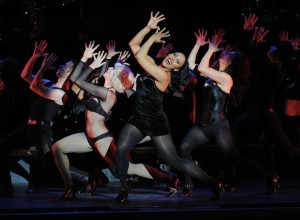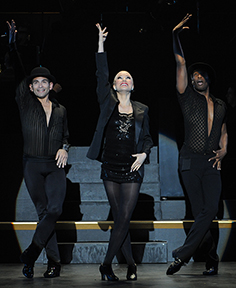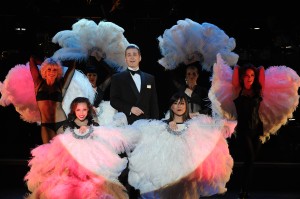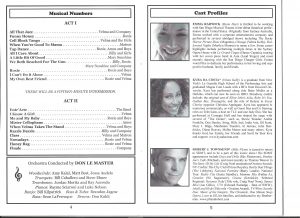Murdering heroines and Fosse never go out of style
Long before Court TV, Nancy Grace, and gossip magazines, we were obsessed with criminals, corruption, and the circus of celebrity. Present day news junkies and paparazzi would have had a field day in 1924 Chicago, as did reporter Maurine Dallas Watkins who covered the scandalous murder trials of two unrepentant women. She turned her reports into a popular play that inspired a silent film, more films, and award-winning musical revivals that we know as Chicago.
In 2013, San Diego Musical Theatre’s Chicago, based on the book by Fred Ebb and Bob Fosse, still seems ripped from the headlines with the nuance of a cabaret show.

Kyra De Costa and Company in the musical Chicago. Copyright © 2013 Ken Jacques Photography.
Roxie Hart shoots her lover but her arrogant lawyer Billy Flynn works the system and her pregnancy to make her a dancing celebrity. Velma Kelly murders her husband and sister when she finds them in bed together, and with Billy’s help, she too makes it big as Roxie’s partner on Vaudeville, but one could easily insert Dancing with the Stars.
Despite the worn storyline (program notes don’t even bother with a synopsis), director Ron Kellum’s production on view at the North Park Theatre through Mar. 3, is professional caliber, not dinner theater, and worth seeing if you enjoy bawdy entertainment.
The dancing and music in this Chicago sizzle, and the satirical sting is timeless. The cast is confident and quick on the repartee – everyone can act, sing, and dance.
Kyra Da Costa as Velma opens the show with the defining “All That Jazz.” She struts and cavorts shamelessly with the sleazy chorus. Her alto voice is unwavering, even while dancing. She has shared the stage with singing superstars, such as Bette Midler as a Harlette. That experience shines in “Funny Honey” with the cell block girls, her breathy solo, “I Can’t Do It Alone,” and in pleasing duets with Ria Carey as Mama Morton, and Emma Radwick as Roxie. .
In the tricky overlapping duet “My Own Best Friend,” Da Costa’s deep rasp contrasts nicely with Radwick’s higher pitched and squeaky Roxie.

Emma Radwick and Company as Roxie Hart. Copyright © 2013 Ken Jacques Photography.
Radwick is also spot-on in the song that reenacts the murder of her lover, “We Both Reached for the Gun.” In the ventriloquist act, the lawyer Billy tells Roxie a new version of the truth that will make her a star, and she mouths the words.
Robert Townsend makes the women jailbirds swoon, and normal women gag, as the conceited lawyer Billy Flynn. In “All I Care About” is love, the women surround him with giant feather fans until only his head is showing, like a giant narcissistic flower.

Robert J. Townsend and feathered company. Copyright © 2013 Ken Jacques Photography.
The cast has you hooked in the first few bars as they pop shoulders and coil splayed fingers. Choreographer Randy Slovacek channels Fosse’s style, and sticks with the authentic moves: simple hip leading walks with hula pushing hands; leggy side steps punctuated with big outstretched arms; shimmies; soft shoe; and high kicks; and a splendid back flip (Christopher James Cortez).
Thin hipped, and singing in falsetto, A. Sander’s portrayal of the quivering columnist Mary Sunshine, fashioned after Watkins who wrote the original play, is immediately suspicious. There’s finally a funny reveal. She/he yammers on about poor Roxie’s baby being born in prison, but frankly, the lines are difficult to understand.
The athletic cast looks fabulous in Janet Pitcher’s raunchy costumes, a range of revealing black underwear, fishnets, and barely-there trunks and skirts as seen in countless productions. There are no costume changes, so by the second act, you’re over it.
The breadth of dancing is limited in part because of space. The 13-piece orchestra, directed by Don Le Master takes up the entire back wall, but nobody would want it otherwise. The 21 songs (music by John Kander and lyrics by Fred Ebb) sound swell, particularly those with whispery drum beats and whiny and tinny brass indicative of jazz from the late 1920s.
Other than the orchestra backdrop and two foldaway ladders on each side of the stage for dramatic climbing-while-singing purposes, there is no set in Chicago. The ensemble plays the part of chorus, reporters, paparazzi, and a lone juror. If you go, watch for the multi-personality juror (Michael Motroni) who responds to testimony with hilarious expression.
In 1996, when Chicago: The Musical played on Broadway, it won six Tony Awards including one for choreography by Ann Reinking, “in the style of Bob Fosse.” Fosse and Reinking were a romantic item, even though Fosse was still married to Gwen Verdon, who had starred in the earlier “Vaudeville” version in 1975.
But Fosse did have a vague moral compass and drew the line in early rehearsals. It’s been said he thought Kander and Ebb’s lyrics in “Class” were too offensive. “Every guy is a snot/ Every girl is a twat,” was cut; the lines about pain in the ass and gas stayed in. “Razzle Dazzle,” first staged as an orgy on the courthouse steps, was switched to naughty split lifts, growls, and clawing hands.
And one could say that compared with many plays, the language and plot in Chicago are tame.
Roxie only recreates shooting her boyfriend while holding a toy gun, and she announces she has to pee. There are songs about hanging and killing someone because they had it coming, but the infectious music is finger-snapping fun.
Still, one has to wonder what the guy in row Q was thinking when he dragged his three very young daughters to a Sunday matinee. Perhaps he thought the glittery outfits and blinding lights near the end would erase memories of the two chorus girls who got away with murder.
But here’s the irony. As the little ones sat quietly on their booster cushions, the adult un-wrapped cellophane candies, which was more annoying than a few crackles from body microphones.
And he crinkled and chewed soon after the song “Mister Cellophane,” a pathetic tune sung beautifully by Jason James, who plays Amos, Roxie’s gullible nobody husband. “If someone in the movie show, yelled ‘fire’ in the second row, ‘this whole place is a powder keg’ you’d notice him…”
After all of that, how could a grown man think nobody would notice his real cellophane? Cellophane, Mr. Cellophane should be his name.
Chicago runs through Sun. Mar. 3. San Diego Musical Theatre’s season of musicals continues with The Sound of Music, May 10-26, and Ain’t Misbehaivin’ Sept. 27-Oct. 13.
Who will own the Birch North Park Theatre by May, is uncertain. A bankruptcy judge could rule on who takes over the 731-seat theater and its operations next week.


